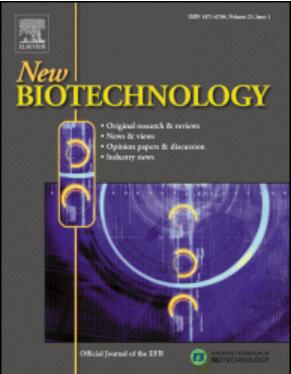Elevated CO2 enhances growth and cyanide assimilation in nitrogen-deficient rice: A transcriptome and metabolomic perspective
IF 4.5
2区 生物学
Q1 BIOCHEMICAL RESEARCH METHODS
引用次数: 0
Abstract
Plants face multiple challenges from environmental pollutants and higher emissions of atmospheric CO2. Therefore, a hydroponic-based experiment was used to explore the combined effects of elevated [CO2] (700 ppm) and exogenous cyanide (CN−) (3.0 mg CN/L) on rice seedlings under nitrogen deficiency, utilizing metabonomic and transcriptomic analysis. Elevated [CO2] significantly improved the growth of CN−-treated rice seedlings compared to those with ambient [CO2] (350 ppm), and it also significantly affected CN− assimilation. Transcriptome analysis revealed distinct impacts on differentially expressed genes (DEGs) across treatments and tissues. KEGG analysis showed variability in DEGs enriched in amino acid (AA) and energy metabolism pathways due to elevated [CO2] and CN−. Metabonomic indicated that higher input of [CO2] and exogenous CN− more severely impacted energy metabolism elements than the individual species of AAs. Positive synergistic effects of elevated [CO2] and CN− were observed for glutamine and asparagine in shoots, and methionine in roots, wherein negative effects were noted for phenylalanine in shoots, and phenylalanine, valine, and alanine in roots. Meanwhile, positive effects on fumarate in shoots and α-ketoglutarate and succinate in roots were also found. Overall, elevated [CO2] enhanced growth in CN−-treated rice seedlings under nitrogen deficiency by altering AA and energy metabolism. This is the first attempt to provide new evidence of [CO2]-based gaseous fertilization as an energy-saving strategy for rice plants fed with biodegradable N-containing pollutants as a supporting N source under N deficient conditions.
高浓度二氧化碳促进缺氮水稻的生长和氰化物同化:转录组学和代谢组学视角。
植物面临着环境污染物和大气二氧化碳排放量增加的多重挑战。因此,本研究通过水培实验,利用代谢组学和转录组学分析,探讨了高浓度[CO2](700 ppm)和外源氰化物(CN-)(3.0mg CN/L)对缺氮水稻幼苗的综合影响。与环境[CO2](350 ppm)相比,高浓度[CO2]明显改善了外源氰化物(CN-)处理的水稻秧苗的生长,同时也显著影响了CN-的同化。转录组分析显示,不同处理和组织对差异表达基因(DEGs)的影响各不相同。KEGG 分析表明,[CO2]和 CN- 升高会导致氨基酸(AA)和能量代谢途径中富集的 DEGs 发生变化。代谢组学分析表明,较高的[CO2]和外源 CN- 对能量代谢元素的影响比对单种 AA 的影响更为严重。高浓度[CO2]和 CN- 对幼芽中的谷氨酰胺和天冬酰胺以及根中的蛋氨酸产生了正向协同效应,而对幼芽中的苯丙氨酸以及根中的苯丙氨酸、缬氨酸和丙氨酸产生了负向效应。同时,还发现芽中的富马酸和根中的α-酮戊二酸和琥珀酸具有正效应。总之,高浓度[CO2]可通过改变 AA 和能量代谢,促进缺氮条件下经 CN 处理的水稻幼苗的生长。这是首次尝试提供新的证据,证明以[CO2]为基础的气态施肥是缺氮条件下以可生物降解的含氮化合物作为辅助氮源喂养水稻植株的一种节能策略。
本文章由计算机程序翻译,如有差异,请以英文原文为准。
求助全文
约1分钟内获得全文
求助全文
来源期刊

New biotechnology
生物-生化研究方法
CiteScore
11.40
自引率
1.90%
发文量
77
审稿时长
1 months
期刊介绍:
New Biotechnology is the official journal of the European Federation of Biotechnology (EFB) and is published bimonthly. It covers both the science of biotechnology and its surrounding political, business and financial milieu. The journal publishes peer-reviewed basic research papers, authoritative reviews, feature articles and opinions in all areas of biotechnology. It reflects the full diversity of current biotechnology science, particularly those advances in research and practice that open opportunities for exploitation of knowledge, commercially or otherwise, together with news, discussion and comment on broader issues of general interest and concern. The outlook is fully international.
The scope of the journal includes the research, industrial and commercial aspects of biotechnology, in areas such as: Healthcare and Pharmaceuticals; Food and Agriculture; Biofuels; Genetic Engineering and Molecular Biology; Genomics and Synthetic Biology; Nanotechnology; Environment and Biodiversity; Biocatalysis; Bioremediation; Process engineering.
 求助内容:
求助内容: 应助结果提醒方式:
应助结果提醒方式:


